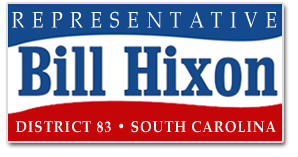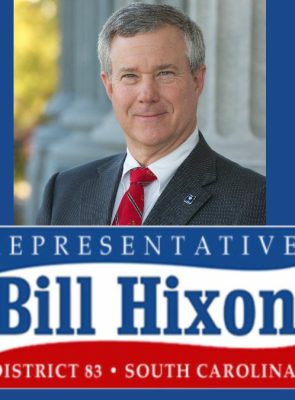Dear Friends,
Please review some of what we passed in the House budget. Remember the Senate can completely redo the budget their way, if so we will try and come up with a compromise of the House and Senate budgets. If we cannot come up with a compromise, a conference committee will be set up of three House members and three Senators. Stay tuned.
The House Budget
 The focus of the House was almost exclusively on the budget. Democrats were seeking to raise taxes on the people of South Carolina in two ways. The first was an increase in taxes for firearms, which would have unfairly penalized lawful gun owners. Republicans soundly defeated the Democrats’ firearm tax increase. The second tax hike push by Democrats was their effort to repeal the Homestead Exemption for one year, also known as Act 388. The Homestead Exemption exempts taxes on the first $50,000 in fair market value for homeowners over age 65, the totally and permanently disabled, or legally blind. House Republicans successfully defeated this tax hike measure put forward by the Democrats.
The focus of the House was almost exclusively on the budget. Democrats were seeking to raise taxes on the people of South Carolina in two ways. The first was an increase in taxes for firearms, which would have unfairly penalized lawful gun owners. Republicans soundly defeated the Democrats’ firearm tax increase. The second tax hike push by Democrats was their effort to repeal the Homestead Exemption for one year, also known as Act 388. The Homestead Exemption exempts taxes on the first $50,000 in fair market value for homeowners over age 65, the totally and permanently disabled, or legally blind. House Republicans successfully defeated this tax hike measure put forward by the Democrats.
The House amended, approved, and sent the Senate H.4644, a bill making revisions to SOLID WASTE MANAGEMENT provisions. The legislation makes revisions to the Solid Waste Management Trust Fund that includes recommendations from the House Legislative Oversight Committee’s review of the Department of Health and Environmental Control. The legislation establishes a SOLID WASTE EMERGENCY FUND, administered by DHEC, that is to be used to address a substantial release or threat of substantial release into the environment of any pollutant or other circumstance which may present an imminent and substantial danger to human health and the environment from a regulated solid waste facility. Two and one-half percent of the funds collected each quarter for the Solid Waste Management Trust Fund must be transferred to the Solid Waste Emergency Fund until the emergency fund reaches an unencumbered balance of $1.5 million. The legislation also provides that a permit to construct a new solid waste management facility or to expand an existing solid waste management facility may not be issued until the applicant provides documentation from the applicable local government of compliance with local land use and zoning ordinances along with the permit application. The legislation establishes permitting, registration, and oversight provisions for facilities that recycle construction and demolition debris.
The House of Representatives amended, approved, and sent the Senate, the General Appropriation Bill, and H.4951, the joint resolution making appropriations from the Capital Reserve Fund, which together comprise the $8.8 billion FISCAL YEAR 2018-2019 STATE GOVERNMENT BUDGET. The budget includes $8.2 billion in recurring state general fund revenue and $145 million in Capital Reserve Funds.
$32.4 million is devoted to the 1% increase in the employer contribution rates for the South Carolina Retirement System and the Police Officers Retirement System that is in keeping with the schedule for addressing the unfunded liability facing the state’s pensions established in Act 13 of 2017.
$56.4 million is included to cover the increased costs of operating the state’s health and dental insurance plans with no increases in the premiums paid by employees and small increases in deductibles and co-payments. Coverage is expanded to include well visits. For K-12 public education, $32 million is used to maintain the base student cost at $2,425 per pupil.
$60 million is provided for a statewide 2% teacher salary increase.
$5 million is used to increase the statewide minimum starting salary for a teacher from $30 thousand to $32 thousand.
$11 million is devoted to technical assistance for low performing schools.
$13 million in Education Improvement Act funds is included to address S.C. Public Charter School District growth. For Fiscal Year 2018-19, and with funds provided to charter school authorizers, institutions of higher education and the South Carolina Public Charter School District may not sponsor more than a combined total of sixty schools.
The Department of Education and the State Law Enforcement Division are directed to form a Crisis Intervention Team to develop a report on school safety plans with recommendations for the General Assembly to consider which may include such school safety measures as physical building security, bullet proof and access-controlled doors, RFID chip in student identification cards, mental health services, and school resource officers.
For Fiscal Year 2018-19, local school districts must observe Martin Luther King, Jr. Day and Memorial Day as legal holidays and schools and offices of the school districts must be closed on those dates. Districts may not use these dates for scheduling make-up days. Schools and school districts may utilize the funds realized from observing those holidays to provide educational training related to the Martin Luther King Jr. Day and Memorial Day observance.
$3 million in recurring funds and $5 million in nonrecurring funds is allocated to purchasing or leasing new school buses.
The Department of Administration is charged with reviewing the state transportation operations at the Department of Education to determine if safety improvements, efficiency, and cost savings are possible. The Department of Education is directed to take part in various state fleet programs and services.
$2 million in Education Improvement Act funds is provided for career and technology education.
A total of $49 million in nonrecurring funds is distributed among the state’s institutions of higher learning to address various capital needs and maintenance issues.
For the upcoming fiscal year, South Carolina public colleges and universities, when reviewing, investigating, or deciding whether there has been a violation of a college or university policy prohibiting discriminatory practices on the basis of religion, must take into consideration a definition of anti-Semitism adopted by the U.S. State Department.
Full funding is provided from the Education Lottery for the LIFE, HOPE, and Palmetto Fellows higher education scholarship programs.
The Commission on Higher Education is afforded $17.5 million in lottery funds for need-based grants, $8.8 million in lottery funds for tuition grants, $496 thousand in lottery funds along with $1.9 million in unclaimed prize money for National Guard Tuition Repayment, and $6 million in unclaimed prize money for the Higher Education Excellence Enhancement Program.
$51.1 million in lottery funds is allocated for tuition assistance through the Commission on Higher Education and the Board of Technical and Comprehensive Education.
The Board of Technical and Comprehensive Education is afforded $9.4 million in lottery funds for the Ready SC Program that provides customized worker training for new and expanding business and industry at the state’s technical colleges, $9.8 million in lottery funds for high demand skill training equipment to be distributed to all technical colleges, and $11 million in unclaimed prize money for workforce scholarships and grants through Career Pathways.
The Department of Health and Human Services is afforded $26.4 million for Medicaid maintenance of effort to address program cost growth, $3.8 million to enhance access and increase provider reimbursement rates for Autism Spectrum Disorder Services, and $4.4 million for opioid use disorder treatment and services.
$7.7 million is provided from the Capital Reserve Fund for a Medicaid Management Information System.
The budget provides for the continuation of Medicaid accountability and quality improvement programs as: the Healthy Outcomes Initiative for meeting the needs of chronically ill uninsured patients in settings outside the comparatively expensive emergency room; a Primary Care Safety Net utilizing such resources as Federally Qualified Health Centers and free clinics; and efforts to enhance provider capacity in rural and underserved areas.
$1.5 million in recurring funds is provided for the state’s telemedicine network and $5 million in non-recurring funds is provided for enhancing telemedicine infrastructure. This brings the recurring dollars total for the SC Telehealth Network to $11.5 million in combined funding through DHHS and MUSC.
$4 million in recurring funds is provided for a Rural Health Initiative partnership between DHHS and the USC School of Medicine to improve access to life-saving emergency room care in the wake of rural hospital closures. $2 million in nonrecurring funds is provided for medical contracts.
The Department of Health and Environmental Control receives $1 million for Best Chance Network/Colon Cancer preventative screenings, $499 thousand for communicable diseases initiatives, $500 thousand for HIV/AIDS prevention and treatment, $350 thousand for an
EMS Performance Improvement Center, and $1 million in nonrecurring funds for water quality initiatives.
From the funds appropriated to the Department of Health and Environmental Control in the fiscal year for HIV and AIDS prevention and treatment, no less than $500,000 shall be authorized for the Joseph H. Neal Wellness Center and CAN Community Health Inc. to develop a partnership to provide comprehensive medical, psychological and educational services to all patients, regardless of their financial situation, insurance status, or ability to pay.
The Department of Mental Health is afforded $4.5 million for supported community housing expansion, $500 thousand for school-based services, and $2 million for Child and Adolescent Intensive Community and Residential Services.
The Department of Disabilities and Special Needs receives $11.3 million for a frontline workforce pay increase and $500 thousand for the Greenwood Genetic Center for Autism Research.
The Department of Alcohol and Other Drug Abuse Services is afforded $1.25 million for an enhanced response to Opioid Use Disorder and $1.75 million for increased opioid treatment and services.
The Department of Social Services is appropriated $20.3 million for a child and family service review, $2.7 million for the state’s share in a federal child care match, and $25 million from the Capital Reserve Fund for the development of the child support system.
The Department of Social Services is directed to promulgate rules and regulations accommodating faith-based child placing agencies that do discriminate against such agencies for declining to offer services that conflict with a sincerely-held religious belief or moral conviction.
A $25 thousand increase is provided for children’s services at the Commission for the Blind.
$2.5 million in recurring funds and $2.7 million from the Capital Reserve Fund is provided for the Deal Closing Fund that the Department of Commerce uses to recruit new business to the state. The Department of Commerce is afforded appropriations of $4 million in nonrecurring funds $6 million from the Capital Reserve Fund for Locate SC to replenish its inventory of suitable sites for business relocations, $1 million in nonrecurring funds for applied research centers, $250 thousand for the SC Manufacturing Extension Partnership,
$150 thousand for Appalachian Regional Commission statewide assessment, and $600 thousand in nonrecurring funds for the Military Base Task Force.
The State Treasurer is directed to loan the State Ports Authority up to $50 million in excess debt service funding to assist with cash flow needs related to the Charleston Harbor Deepening Project. When the federal government’s share of the project is received, the state is to be reimbursed for the full amount of this loan.
$1.5 million is appropriated to the Department of Agriculture for statewide agribusiness infrastructure and site preparation for relocation prospects. $500 thousand is provided for Agribusiness Development Grants to help support the production of fresh fruits and vegetables that are available as healthy food options in rural and underprivileged urban communities.
The Clemson PSA receives $2 million for water resource research, $3 million from the Capital Reserve Fund for water research facility renovation, and $3 million from the Capital Reserve Fund for research and education center infrastructure.
The Department of Natural Resources is allocated $3 million in recurring funds and $500 thousand in nonrecurring funds for statewide public wildlife and fisheries management projects, $1.9 million for salary realignment, $404 thousand for law enforcement officer step increases, $415 thousand for vehicle rotation, and $502 thousand for information technology.
The Conservation Bank Trust is afforded $3.5 million in recurring funds and $1.5 million from the Capital Reserve Fund.
The Department of Parks, Recreation and Tourism receives $11 million from the Capital Reserve Fund for beach renourishment, $3 million from the Capital Reserve Fund for State Park maintenance, $2.5 million for its Sports Marketing Grants Program, and $4.1 million in nonrecurring funds for the Parks and Recreation Development Fund for PARD grants to local communities.
The Sea Grant Consortium receives $50 thousand for a coastal economist.
The Forestry Commission is afforded $1.5 million for forester recruitment and retention, $945 thousand for forest inventory and analysis, and $1.5 million in nonrecurring funds for safer firefighting equipment.
The Arts Commission is appropriated $350 thousand for community arts development.
A Lottery Reserve Trust Fund is established in case the state should need to pay claims from December 2017 when the South Carolina Education Lottery issued more winning tickets than intended. The trust fund is afforded $41 million in lottery funds along with all net lottery proceeds, investment earnings, and unclaimed prize money for the year.
A proviso is included to allow Education Lottery tickets to be purchased not only with cash, but also with debit cards. Credit cards and other forms of payment remain prohibited.
$22 million is used to provide full funding for the constitutional reserve accounts that the state uses to cope with revenue shortfalls.
The Local Government Fund is maintained at a funding level of $222 million.
The Judicial Department is afforded $7 million from the Capital Reserve Fund for case management modernization, $900 thousand from the Capital Reserve Fund for building maintenance, and $1.1 million from the Capital Reserve Fund for Supreme Court security.
The State Law Enforcement Division is provided $956 thousand for law enforcement officer rank change, $1 million in recurring funds for vehicle rotation to fully implement a five-year rotation cycle, $1 million in recurring funds and $1.6 million in nonrecurring funds for technology equipment and software.
The Illegal Immigration Unit is transferred from the Department of Public Safety to the State Law Enforcement Division.
The Criminal Justice Academy is afforded $992 thousand to expand training from 12 to 15 weeks.
The Department of Public Safety is appropriated $1 million in recurring funds for Highway Patrol officer overtime and $400 thousand in recurring funds for local law enforcement grants.
The Department of Corrections receives $3.7 million for its correctional officer hiring rate adjustment and retention plan to reduce turnover rate at the agency by increasing the starting salary for a correctional officer by $750 and allowing a pay increase for existing officers. $1.7 million is provided for the first half of the department’s Workforce and Reentry Services initiative for equipping inmates with skills that will help them to reenter society.
The Department of Corrections is directed head a review of the therapeutic use of cannabidioil oil for eligible incarcerated individuals and submit recommendations to legislators on the feasibility of conducting a pilot program and whether this CBD oil might be a more effective and less expensive alternative to the psychotropic drugs currently used to treat various mental illnesses and conditions.
The Department of Probation, Parole, and Pardon Services is provided $1.1 million in recurring funds for its agent vehicle support plan and $863 thousand for an expansion of its Offender Supervision Specialist Program to 8 additional counties bringing the total to 28 counties.
The Department of Juvenile Justice receives $3.6 million for the treatment of the severely mentally ill and $170 thousand in nonrecurring funds for child advocacy centers.
The Department of Administration is afforded $3 million for its statewide Information Technology Shared Services Program Management Office, $1 million for the Guardian Ad Litem Program, and $4.5 million from the Capital Reserve Fund for state-owned building maintenance.
The scope of the current Healthcare Employee Recruitment and Retention Program is expanded so that agencies can use the program’s incentives to attract employees in other fields that are critically needed for the public’s safety and welfare.
The State Election Commission receives $250 thousand for election security infrastructure and $4 million from the Capital Reserve Fund for the refurbishment of the current statewide voting system. In anticipation of purchasing a replacement for the current system, $4 million is placed in a New Statewide Voting System Reserve Fund.
The State Ethics Commission receives $133 thousand for program assistants and $123 thousand for an investigator position.
The Human Affairs Commission receives $20 thousand for administrative hearings and $80 thousand for compliance programs.
Clarification is provided for how the Department of Transportation may hold emergency meetings to address such circumstances as hurricanes, floods, ice storms, and other natural disasters.
The Adjutant General receives appropriations of $451 thousand for emergency preparedness operations, $120 thousand for South Carolina State Guard personnel expenses, $115 thousand for state operations expenses, and $1 million in recurring funds along with $3 million from the Capital Reserve Fund to be used with federal matching dollars for armory revitalizations.
The Department of Motor Vehicles is afforded $5.6 million from the Capital Reserve Fund for REAL ID implementation costs, $379 thousand in recurring funds for operators to run the federally-mandated State to State Help Desk required to maintain compliance with the REAL ID Program, and $428 thousand in recurring funds for implementing the recently enacted Moped legislation.
$275 thousand is provided from the Capital Reserve Fund to the Division of Aeronautics for facilities maintenance.
The Lieutenant Governor’s Office on Aging receives $20 thousand for state matching dollars.
The Department of Archives and History receives $200 thousand in nonrecurring funds for the conservation of South Carolina’s seven constitutions, $250 in nonrecurring funds for the Charleston Library Society Beaux Arts Building, and $200 thousand from the Capital Reserve Fund for architectural heritage preservation.
The State Library is afforded $167 thousand to expand the DISCUS virtual library system and $431 thousand for bookmobile services.
The State Fiscal Accountability Authority is directed to develop guidelines regarding covered contracts exceeding $50,000 that state agencies enter into which incentivizes contractors to pay their employees promptly.
As always, thank you for the privilege of serving you in Columbia. If I can ever be of assistance to you or if you have ideas on issues you want me to share with the rest of the General Assembly, please do not hesitate to contact me.




